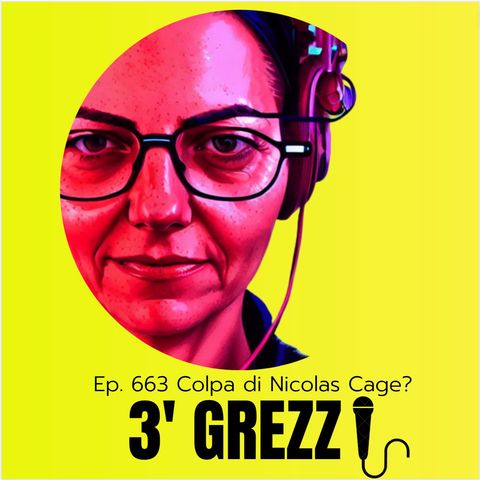3' grezzi Ep. 663 Colpa di Nicolas Cage?

Descarga y escucha en cualquier lugar
Descarga tus episodios favoritos y disfrútalos, ¡dondequiera que estés! Regístrate o inicia sesión ahora para acceder a la escucha sin conexión.
3' grezzi Ep. 663 Colpa di Nicolas Cage?
Descripción
Cosa c'entra Nicolas Cage con il numero delle persone morte annegate dopo essere cadute in piscina? C'entra, c'entra, anche se non nel modo che immaginate! TRASCRIZIONE [ENG translation & link...
mostra másTRASCRIZIONE [ENG translation & link below]
Se prendiamo delle statistiche, statistiche vere, serie, fatte da enti di cui noi ci fidiamo, anche in questo caso però, le statistiche possono dire quello che vogliono, anche se i numeri sono esatti, perché è sempre una questione di come vengono interpretate.
Questo aspetto viene reso ancora più grave se si pensa che spesso, quando si parla di statistiche, si confonde la correlazione con la causazione. Cosa sono queste due cose? L'esempio che si fa sempre è: d'estate aumenta la vendita dei gelati, d'estate aumenta anche il numero delle persone che si scottano perché stanno troppo al sole, quindi vediamo che c'è d'estate un aumento vertiginoso della vendita, del consumo di gelati e un aumento vertiginoso delle scottature sulla pelle. Ma l'acquisto dei gelati non ha assolutamente niente a che vedere con le scottature sulla pelle, non è che ci scottiamo perché acquistiamo il gelato, è che questi due eventi, per caso, si verificano contemporaneamente o comunque nello stesso periodo.
Quindi questo è un errore che viene fatto molto spesso. E ora ho scoperto un sito dove questo errore, non solo viene amplificato, ma viene usato per degli effetti secondo me molto divertenti, cioè si mettono a confronto delle percentuali che hanno lo stesso andamento, quindi hanno più o meno gli stessi numeri aumentano contemporaneamente però di cose che non hanno assolutamente a che fare l'una con l'altra.
Vi faccio qualche esempio allora: il primo è il numero di persone che annegano perché sono cadute in una piscina correlata ai film in cui appare Nicolas Cage, sono delle percentuali che vanno dal 1999 fino al 2009, nel 2007 ci sono stati 4 film di Nicolas Cage e 123 persone annegate nella piscina, nel 2003 è sceso moltissimo questo rapporto perché solo un film di Nicolas Cage e 85 persone annegate in piscina.
Un altro dato che mi ha fatto ridere è le percentuali di divorzio nel Maine e l'uso pro capite di margarina, anche questo ha un andamento assolutamente costante, viene tracciato dal 2000 al 2009; poi vi posso proporre l'età di Miss America correlata alle persone che vengono assassinate usando vapore, vapori caldi oppure oggetti caldi: anche qua l'andamento è pressoché identico.
Insomma, sono degli esempi molto divertenti che però vi ho voluto fare, magari per invogliarvi, la prossima volta che su un giornale leggete delle cose messe insieme, a chiedervi: ma sono veramente delle cose che ci appiccico una con l'altra o sono semplicemente delle cose che, per caso, si sono verificate nello stesso momento?
Comunque vi metto il link al sito.
TRANSLATION
If we take statistics, real, serious statistics, made by entities we trust, you see, despite that, statistics can say whatever they want, even if the numbers are accurate because it is always a question of how they are interpreted.
This is made even more serious when one considers that correlation is often confused with causation when it comes to statistics. What are these two things? The example that is always given is: in summer the sale of ice cream increases, in summer the number of people who get sunburned from being in the sun too much also increases, so we see that there is in the summer a dramatic increase in the sale, consumption of ice cream and a dramatic increase in skin burns. But buying ice cream has absolutely nothing to do with sunburn, it is not that we sunburn because we buy ice cream, it is that these two events, by chance, occur together, or at the same time.
So this is a mistake that is made very often. And now I've discovered a site where this error, not only is amplified, but it's used for effects I think very amusing, that is, you compare percentages that have the same trend, so they have more or less the same increase at the same time however of things that have absolutely nothing to do with each other.
Let me give you a few examples then: the first is the number of people drowning because they fell into a pool correlated with the movies with Nicolas Cage, these are percentages from 1999 until 2009, in 2007 there were 4 Nicolas Cage movies and 123 people drowned in the pool, in 2003 this ratio dropped a lot because only one Nicolas Cage movie and 85 people drowned in the pool.
Another figure that made me laugh is the divorce rates in Maine and the per capita use of margarine, this also has an absolutely constant trend, it is tracked from 2000 to 2009; then I can offer you the age of Miss America correlated with people being murdered using steam, hot steam or hot objects: again the trend is almost identical.
I mean, these are very amusing examples that I wanted to give you though, maybe to entice you, the next time you read things put together in a newspaper, to ask yourself: but are they really things that have something to do with the other or are they simply things that, by chance, occurred at the same time?
Anyway, I will put the link to the site in the program notes.
LINK https://www.tylervigen.com/spurious-correlations?utm_source=pocket_saves&utm_medium=email
Información
| Autor | M. Cristina Marras |
| Organización | M. Cristina Marras |
| Página web | - |
| Etiquetas |
Copyright 2024 - Spreaker Inc. an iHeartMedia Company

Comentarios